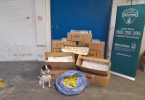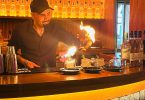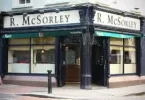LVA Conference 2022
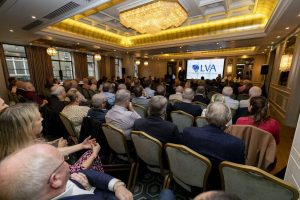
In opening this year’s Licensed Vintners Association Conference, attended by over 180 in Dublin’s Westbury Hotel, broadcaster, journalist and MC for the afternoon Ivan Yates declared this his favourite ‘gig’ of the 50 or so he compared each year.
“It’s one of the few where the audience might well know more than the speakers,” he smiled.
Despite that, 2023 could present the biggest challenge as energy costs soar and staff retention, pay and other costs mount up for the besieged publican.
With this in mind, Ivan introduced the afternoon’s first speaker, the LVA’s Human Resources Adviser Gillian Knight who spoke about staff retention, pay and benefits in a full-employment economy.
What had been 40,000 hospitality vacancies are now just 22,000 according to Fáilte Ireland’s figures.
Gillian had undertaken membership surveys that found 50% of employers considered their staff passionate about their job – 70% regarded it as a long-term career move.
High staff turnover & stress
High staff turnover levels can cause stress among remaining staff, reduced customer care or even incompetence, with more management time taken up by ongoing recruitment.
Companies with low staff turnovers tend to enjoy high levels of staff engagement, she said.
To counter recruitment difficulties she’d found that 97% of LVA members had increased pay in the last 12 months. 83% agreed that staff shortages caused added stress, 74% believed it impacted customer experience and 72% believed it reduced capacity/trading hours. Some outlets only open five days a week. Others have abandoned breakfasts and lunches, serving to only 9pm. All agreed however that if they’d the staff they could open every day of the week.
But only 16% believed they faced closure as a result of staff shortages.
Methods of employee retention
A study produced by Fáilte Ireland early this year found that the methods currently used to retain employees in the industry included increased pay (71%), more flexible work patterns (69%), more predictable work schedules/set hours (64%), improvements to working environment (56%), more opportunities for career progression (51%), improved non-pay benefits (43%), less unsocial hours (37%), assistance with further education (37%) and ‘wellness support’ (34%).
Gillian compared this to the methods used by LVA members to retain/attract employees.
Increasing pay had been the favourite option for 83% of members here while weekends off had been adopted by 41%; promotion had taken place among the staff in 22% of members’ outlets and an Employment Assistance Program had been introduced in 18% of cases.
Additional annual leave had been granted in 17% of cases while 16% had increased bonus payments, 13% had established recognition programs and 7% had decided on educational funding.
Design trends
Ronan Holohan of Millimetre Design spoke on the latest design trends for pubs and restaurants worldwide. He talked of the “blurred line” between bars, restaurants and nightclubs now which has led to many outlets layering their offer to clients to take advantage of a more diverse clientele.
Ronan is a strong believer in ‘biophilic design’ which seeks to connect those within the building more closely to nature.
“People want a space where they feel they’re outdoors,” he explained before going on to show some striking examples of this development worldwide.
In a social media age, these outlets proved good for photos in premises, he said.
Food trends
Pól Ó Conghaile, Travel Editor with the Irish Independent and a regular contributor to National Geographic Traveller, talked about food trends.
One of the positive takeaways from Covid had been the growth in the number of ‘horse box’ stalls outside some pubs, raising consumer interest in a new range of foods.
However where full menus were not an option, he advised publicans to consider extending their snackfoods selection into the wide range of more adventurous products now available rather than just crisps and peanuts – “… extra revenue and a talking point too”.
He also advised publicans to rethink times when the pub is quiet, suggesting that they consider creating selling spaces between breakfast and lunch, dinner and late night.
This could be brunch on the weekend or laying on all-day desserts or special offers such as ‘Taco Thursdays’
“Table for one, Madam?”
Pól also highlighted the lack of space designed for single customers on their own. Women (and men) can feel uncomfortable going into a licensed premises on their own and licensees could greatly benefit from a more thoughtful means of accommodating such individuals. This would pay huge word-of-mouth dividends, he believed.
‘Pet friendly’ pubs
Some pubs, such as those in the Brewdog chain, had made their pubs ‘pet friendly’ with good results.
Other establishments such as hotels had introduced the latest technology such that rooms could be opened, meals could be ordered and even TVs could be controlled – all remotely by use of an app on the customer’s own smartphone.
Publicans panel

The Publicans’ Panel (from left): Trevor O’Shea, Noel Anderson, LVA Chair Alison Kealy and Alan Clancy. (Iain White Photography).
Former LVA Chairman Noel Anderson & Bodytonic Group’s Trevor O’Shea joined NolaClan’s Alan Clancy and LVA Chair Alison Kealy on the Publicans Panel following the presentations.
Ivan got the ball rolling by asking what, for them, had been the legacy of Covid?
Trevor O’Shea had had to learn to be a lot of different things during Covid while Noel Anderson was pleased to be able to report that, “Every time we reopened the customers were keen to get back in and that gave me confidence”.
He’d been struck too by how those in the trade had helped each other through it, as had suppliers.
Alison Kealy had found adapting the business during Covid difficult but had enjoyed the benefit of having had a great team behind her. The LVA had been of great help here too.
“And what of the €3 billion tax warehoused?” enquired Ivan.
“Hopefully we’ll be able to manage by paying it gradually,” suggested Alison.
Staffing
The midnight business never came back, said Alan Clancy, “The biggest problem is still the loss of staff. Our trained staff found other avenues; they found a better life balance. This, for me, is the hardest part – to build training back up again”.
Ivan pointed out that the Hotels Federation reckons that some 19,000 people have left the industry.
“Getting staff is not as difficult as it was but holding onto them has proved difficult,” said Trevor, “Getting people to be interested and passionate about the job is more difficult and the chef situation is still very difficult.”
Noel agreed.
“When we reopened everyone looked for pay rises,” he said.
Structural hierarchy was made transparent to his staff so that they could see what could be achieved.
“We’re paying mangers 15% more than we did pre-Covid,” he said, “I think this is imperative.”
But in this day and age accommodation problems loom large for his staff.
“They’re coming to us as they need pay increases to find somewhere to live. If the housing crisis could be solved it’d solve a lot of the problems we have.”
Kealys was constantly recruiting, agreed Alison, who pointed out that, “We’re struggling on finding more experienced people”.
Rent
Another issue during Covid had been rental legacy and how ‘understanding’ landlords could be (or otherwise).
“Most of them addressed this very early on in the pandemic,” said Alan who’d found the bigger the landlord the easier to deal with.
“Nearly all our landlords will end up with about 50% of what they’ve lost over Covid,” Alan reckoned.
The weekend
Ivan pondered whether there had been a telescoping of business into Fridays and Saturdays.
“Thursdays for me are now much busier than they were” said Noel, “so we’ve got this as well as Friday and Saturday.”
Thursdays had proved particularly strong, agreed Trevor, but his Fridays had been “up and down” as had Saturdays.
“Where things will go next year I don’t know,” he concluded.
Alan took each unit on an individual basis in assessing business.
He believes too that the indigenous population from the country are not coming to Dublin as often as they used to.
Staff training
The LVA currently had around 35 students on courses but Ivan wondered if that was enough, to which Alison pointed out that they have two such courses a year.
At Kealys she was “trying to be clever in our use of key people. We’re trying to balance out experienced staff throughout the week”.
Cost control
Rising costs coupled with pay demands become a vicious cycle that’s difficult to escape.
But what can be done to control costs?
“Well we’re not trying to open all the time just hoping people will come through the door,” answered Alan, “That’s a waste of time. I now get hourly reports on what we’re getting for opening.”
He judges the value of opening now on the amount of activity vs that when open all the time.
He’d closed down lots of energy-sapping things such as heating and air conditioning that don’t need to be on.
“We’ve a management meeting every week,” said Noel, “Costs are always on the agenda and energy costs are made front-of-mind.”
He recalls going into one bar which had heaters on but the door open.
“You must get staff conscious of energy costs and show them the bills,” he emphasised.
With food, he’s hoping to use group purchasing to steady his costs and hopes not to have to pass it on to the consumer.
Food costs
Like most in the LVA Alison was experiencing huge difficulty on the food side.
“Cooking oil is up 120%, for example” she said, “and we can get three price increases in a month now from food suppliers.”
Gas bills had risen four-fold.
“Electricity is up two-fold, so we need to manage things very carefully at the moment.”
Trevor is bringing in solar panels and trying to reduce waste.
“Drink prices are OK at the moment but it’s no longer a case of negotiating downwards any more.”
Noel advised all in the room to check that they’re still in contract with their present energy supplier.
“Use experts to analyse your bill, the energy market and what may be your best move,” he said, “And always submit meter readings to get an accurate bill.”
Social media
Ivan asked the panel what works for them in terms of broadening their appeal through social media.
Kealys tries to create a community atmosphere via social media while Noel pointed out that at his venues, a Staff Member of the Month is operated where that pictured member is highlighted.
Trevor uses social media even ‘though he personally dislikes it.
Societal drinking habits changed?
Ivan put it to the panel that with Cocktails, changes in drinking habits and Gen Z etc consumers are drinking less but perhaps more expensively.
“It’s only going one way with people drinking less and being more image- and health-conscious,” responded Trevor, “Non-alcoholic Guinness and Heineken0.0% are game-changers. People are going to the pub for a NoLo drink now.”
Noel agreed that in the last three years the trade has had to embrace the NoLo trends out there – and margins are just as good for non-alcoholic drinks.
“We’ve a page of non-alcoholic Cocktails on our menu now.”
Cocktails still return the highest margin in the pub he pointed out.
When people returned to the pub they showed great appreciation for the draught product, said Alison who observed that Gen X males will start off with pints but can move onto Cocktails.
“Since the pubs came back Premium products are in demand,” noted Alan.
2023
Is there a sense of dread building in the Dublin trade for 2023 thanks to the likely return of the old VAT rate, rising consumer mortgages etc post-Christmas, asked Ivan, who personally believed that it would be the bigger ticket items that might be cut while smaller items such as spending €20 in the pub would remain.
Alan emphasised that, “We, as a nation, enjoy going out, it’s in our DNA. People will value things more and will go out and have a good experience, but they’re going to value the money more so they’ll be more calculating in what they choose to do. They’re going to go out once or twice a month but they’re going to go out ‘well’.”
Donall O’Keeffe’s conclusions
LVA Chief Executive Donall O’Keeffe summed up the conference proceedings.
“There seems to be a realistic confidence that we’ll do the job that’s ahead of us,” he said,
“It has been three years since the last time we were all in the same room.
“Suppliers rowed in quickly at the start of the pandemic. They took back kegs and supported us.
“The Government came good in the second half of Lockdown with financial support. A lot of mistakes were made by everyone but financially, they were there when we needed them.
“Pubs have also embraced the outdoors, which we welcome.
“Arising from Covid we confirmed that customers love our pubs and came back at every open door opportunity. The outlook from here to Christmas is overwhelmingly positive.
“Amazingly, the capital value of pubs has grown, a real sign of optimism and a barometer for the trade.
“So, in summary, the tokens for Christmas are strong. This will be the first proper Christmas in three years and we’ll have to build service requirements around it.
“As for 2023 onward, we’re not going to see double-digit declines in the trade,” he predicted, “It won’t be like 2008 or Covid, but one thing we have to get better at is financial management. Are we making money this day, this week, this month?
Financial management will be a key strength with energy costs etc.
“As for Premiumisation – can you deliver against that demand?” he asked.
“Health-consciousness is growing, manifesting itself in the drinks business in terms of No and Lo-Alcohols. We need to do a better job on that. There’s a clear consumer demand.
“But the single biggest challenge to trade in the next 12-24 months is consistent delivery of quality despite the inexperience of new staff and untrained staff.
“We need to professionalise how we manage our staff above and beyond the legal requirement.
“I think that the pace of change will accelerate, competition will intensify and grow bigger but at the same time, if done right, the rewards will be bigger too.”
All proceeds from the conference went to the charity Ireland for Ukraine.
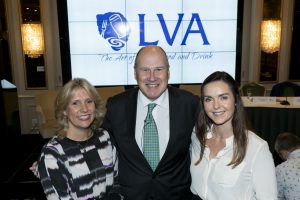
From left: LVA Chair Alison Kealy, Ivan Yates and LVA Vice Chair Laura Moriarty. (Iain White Photography.)




